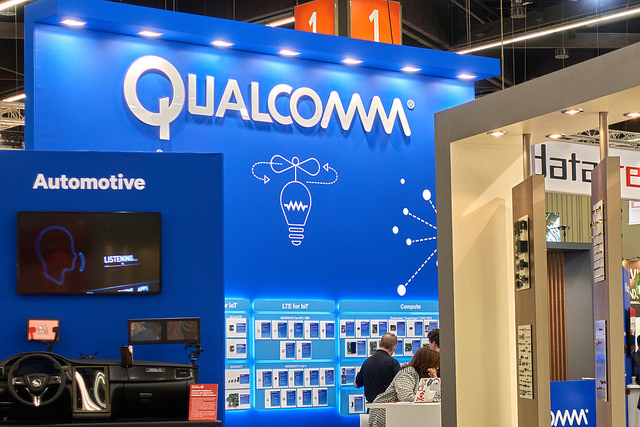 INFRA
INFRA
 INFRA
INFRA
 INFRA
INFRA
Qualcomm Technologies Inc. has taken another stab at Apple Inc. in the companies’ pitched legal battle, accusing the iPhone maker of infringing six of its patents and demanding a ban on the import of iOS handsets into the U.S.
The company said in a statement Thursday that iPhones and iPads powered by Intel’s 4G wireless chips are using six of its inventions without permission. Qualcomm has asked the U.S. International Trade Commission to ban imports of those phones into the U.S. In addition, the company also wants the ITC to ban the marketing and distribution of those handsets.
Cnet reported that the ban would include iPhone 7 and iPhone 7 Plus models sold by AT&T Inc. and T-Mobile International AG, as well as some versions of the Apple iPad. Devices sold by those two companies run on Intel chips, whereas phones offered by other companies such as Verizon Wireless Inc. run on Qualcomm’s chips. It therefore looks as if Qualcomm is trying to limit the scope of the ban to avoid impacting its own chip business, which brings in a huge amount of revenue from supplying Apple.
“Qualcomm’s inventions are at the heart of every iPhone and extend well beyond modem technologies or cellular standards,” Qualcomm Executive Vice President and General Counsel Don Rosenberg said. “The patents we are asserting represent six important technologies, out of a portfolio of thousands, and each is vital to iPhone functions.”
The chip maker asked the ITC for a cease-and-desist order to block imports of the offending devices, and also to halt the “marketing, advertising, demonstration and warehousing of inventory for distribution and use of those imported products.” In addition, the company is suing Apple in California’s courts over the patent infringement.
The ITC is a common destination for companies locked in a patent dispute. The federal agency doesn’t rule on the validity of patents itself, but can take steps to prevent products from being imported into the U.S., and like most tech products, the iPhone is largely made in China. An ITC ruling can therefore shift the balance of power in settlement negotiations, should Apple and Qualcomm decide to sit down and talk things through.
Rosenberg told Cnet the ITC will examine its complaint in August, with a trial likely to follow in 2018. As such, any ban probably wouldn’t come into effect for at least 18 months.
Qualcomm’s action is the company’s latest response to accusations made by Apple last January that the chip maker has been overcharging it and its partners over royalty fees. Apple filed a lawsuit against Qualcomm demanding that it repay $1 billion in overpayments, and has also filed to have 18 of the company’s patents declared invalid.
The mobile chip maker was recently forced to slash its financial expectations for its fiscal third quarter, in case Apple affiliates withhold payments from Qualcomm. A slew of Wall Street analysts has lowered their expectations for Qualcomm as a result.
“Qualcomm’s illegal business practices are harming Apple and the entire industry,” said a spokesperson for Apple. “They supply us with a single connectivity component, but for years have been demanding a percentage of the total cost of our products – effectively taxing Apple’s innovation.”
Apple said it shouldn’t have to pay Qualcomm for “technology breakthroughs they have nothing to do with. We’ve always been willing to pay a fair rate for standard technology used in our products, and since they’ve refused to negotiate reasonable terms we’re asking the courts for help.”
Support our mission to keep content open and free by engaging with theCUBE community. Join theCUBE’s Alumni Trust Network, where technology leaders connect, share intelligence and create opportunities.
Founded by tech visionaries John Furrier and Dave Vellante, SiliconANGLE Media has built a dynamic ecosystem of industry-leading digital media brands that reach 15+ million elite tech professionals. Our new proprietary theCUBE AI Video Cloud is breaking ground in audience interaction, leveraging theCUBEai.com neural network to help technology companies make data-driven decisions and stay at the forefront of industry conversations.